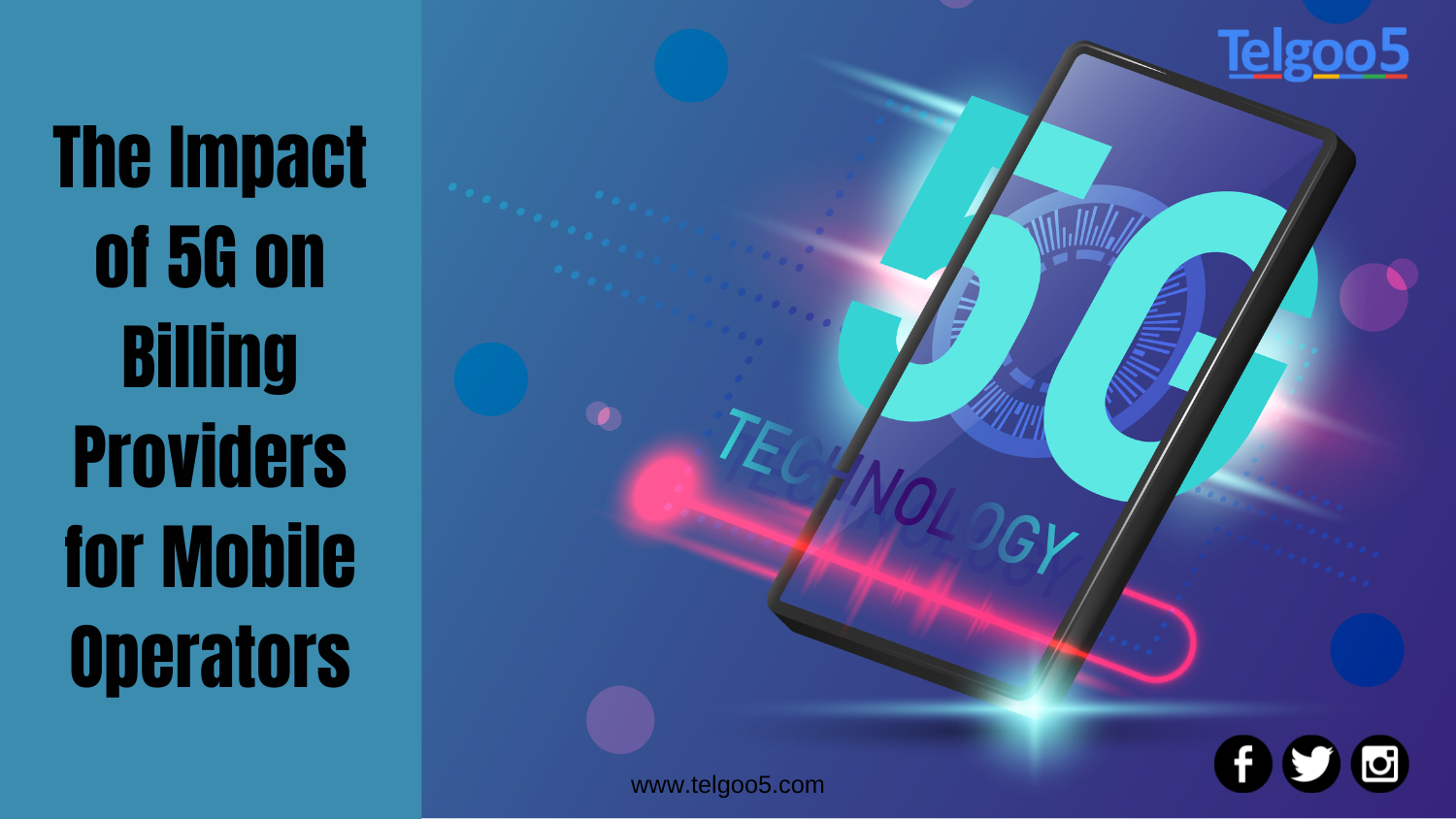
The Impact of 5G on Billing providers for Mobile Operators
The advent of 5G technology is revolutionizing the mobile telecommunications industry, and it has a significant impact on billing providers that serve mobile operators. This blog explores the top ten ways in which 5G is transforming the role of billing providers. From dynamic pricing models and increased data volume to enhanced revenue opportunities and network slicing, we delve into the key aspects that highlight the evolving landscape of billing services in the era of 5G.
1: Dynamic Pricing Models and Service Flexibility
One of the notable impacts of 5G on billing providers is the emergence of dynamic pricing models. With 5G’s increased network capacity and flexibility, billing providers can enable mobile operators to offer innovative pricing structures based on factors such as data speed, latency requirements, and network congestion. This allows operators to tailor pricing plans to individual customer needs, providing greater service flexibility and enhancing customer satisfaction.
2: Increased Data Volume and Usage
5G brings significantly higher data speeds and capacity, leading to a substantial increase in data volume and usage. For billing providers, this means handling larger amounts of data and ensuring accurate and efficient billing processes. They need to adapt their systems and infrastructure to handle the surge in data traffic, maintain real-time charging capabilities, and accommodate the exponential growth in data consumption by subscribers.
3: Network Slicing and Billing Differentiation
5G introduces network slicing, which allows the creation of multiple virtual networks within a single physical infrastructure. This capability enables mobile operators to provide differentiated services to various customer segments. Billing providers play a crucial role in supporting network slicing by implementing billing systems that can accurately track and bill for the usage of different network slices, enabling operators to monetize these customized services effectively.
4: Edge Computing and Latency Management
5G’s low latency capabilities, coupled with edge computing, enable the delivery of real-time services and applications. Billing providers must align their systems with edge computing infrastructure to ensure accurate and timely billing for services that rely on low latency, such as autonomous vehicles, remote surgeries, and augmented reality experiences. Efficient latency management becomes a critical factor in providing seamless and reliable billing services.
5: Enhanced Revenue Opportunities
The introduction of 5G opens up new revenue opportunities for mobile operators, and billing providers play a vital role in capitalizing on these opportunities. With the proliferation of Internet of Things (IoT) devices, smart cities, and industrial applications, billing providers can enable operators to monetize these services through specialized billing models, revenue sharing agreements, and value-added service offerings.
6: Complex Partnerships and Revenue Settlements
As 5G paves the way for new business models and partnerships, billing providers must adapt to manage complex revenue settlements between mobile operators, content providers, and other ecosystem partners. They need to implement robust revenue sharing mechanisms, ensure accurate revenue distribution, and facilitate seamless financial transactions between multiple stakeholders in the 5G ecosystem.
7: Enhanced Customer Experience and Personalization
5G’s capabilities enable enhanced customer experiences and personalization, and billing providers play a crucial role in supporting these initiatives. With advanced billing systems and analytics, providers can enable operators to offer personalized billing plans, real-time usage notifications, and tailored promotions based on individual customer preferences. This fosters customer loyalty, engagement, and satisfaction in the era of 5G.
8: Data Security and Privacy
With the vast amount of data generated by 5G networks, ensuring data security and privacy becomes paramount. Billing providers must implement robust security measures to protect sensitive customer information and comply with data protection regulations. They play a vital role in safeguarding customer trust and maintaining the integrity of billing systems in the era of 5G.
9: Advanced Analytics and Insights
5G generates a wealth of data, and billing providers can leverage advanced analytics to derive actionable insights. By analyzing billing data, usage patterns, and customer behavior, providers can offer valuable insights to mobile operators, empowering them to make informed business decisions, optimize revenue streams, and deliver targeted services to their customers.
10: Agility and Scalability
The dynamic nature of 5G requires billing providers to be agile and scalable in their operations. They need to adapt quickly to changes in service offerings, pricing structures, and billing requirements. Scalable billing systems and infrastructure are essential to handle the increasing complexity and volume of transactions, ensuring that mobile operators can scale their operations effectively in the 5G era.
Conclusion:
The advent of 5G technology has a profound impact on billing providers for mobile operators. From dynamic pricing models and increased data volume to network slicing and enhanced revenue opportunities, billing providers must adapt their systems and processes to meet the changing needs of operators in the 5G era. By embracing the transformative potential of 5G and leveraging advanced technologies such as edge computing, advanced analytics, and robust security measures, billing providers can position themselves as valuable partners in enabling the success of mobile operators in the dynamic and evolving landscape of 5G telecommunications.
Contact us today to get a consultation!
Send us a message to get answers to any of your questions & we'll get back to you within 24-48 hours or as soon as possible.
